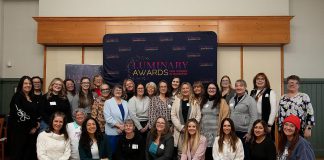When it comes to advancing in their careers, skilled tradespeople have two choices open to them: continue to work for somebody else or boldly strike out on their own.
While tempting for anyone with an entrepreneurial bent, being your own boss is fraught with landmines as one takes on responsibilities well out of one’s comfort zone; tasks such as financing and banking, managing cashflow, business tax record-keeping and filing, and hiring as needed.
Sensing that a number of skilled tradespeople are looking to launch their own business, the Innovation Cluster Peterborough and the Kawarthas announced its new BuildUP program this past spring. With 70 applications received for only 20 spots, the first program cohort was expanded to take on 35 participants.
Last Tuesday (August 12) at the Innovation Cluster’s Venture North location in downtown Peterborough, the initial eight-week program wrapped up with a final session titled “Hiring Your First Team Member.” It was facilitated by Grant Conrad, the owner of WorkforceWins, a Peterborough-based human resources outsourcing company servicing construction and trades businesses.
That session was preceded by seven others: “What It Takes To Be An Entrepreneur,” “Tax Basics,” “Banking and Finding Financing,” “Managing Cashflow and Business Insurance,” “Bookkeeping Without The Headache,” “Reputation and Customer Service That Wins Repeat Business,” and “Sales That Feel Natural.” Each session was led by one of the Innovation Cluster’s experts in residence.
“They’ve got that drive — that spark in their eye,” assessed Conrad of the group that sat before him, adding “They were like ‘How does this work? How does that work?’ That’s the kind of people who step up.”
“I was tasked to talk about how to hire your first person. We went through employment agreements and job ads. We talked a bit about company culture, and performance management, and even termination and the Employment Standards Act — those tricky little rules government has about what you can do and can’t do. It was lot to cover in an hour.”
Of the inaugural program cohort, more than half were workers licensed by Skilled Trades Ontario, with another 40 per cent currently working in the trades and six percent completing apprenticeships.
The top trades represented were electricians and carpenters, at 17 per cent each, HVAC specialists at 11 per cent, plumbers at six per cent, and, at three per cent, millwrights.
Among the initial program participants were Patrick Carty and Mike Thurston — both of whom offered glowing reviews of the information received and its value.
“It was very valuable — it didn’t go into huge depth but it gives an overview so you know what you don’t know,” said Carty, who does commercial HVAC work, adding that the program helped focus on where to spend time and effort “as opposed to just blindly searching the internet on how to run a business.”
Carty outlined the benefits he sees in building his own business.
“Things are great now where I work, but I have four young children. I want to grow something that I can maybe give to them someday, and be able to adjust my time so I don’t miss school events and things like that.”
“If I work for myself, I can go to their event at two o’clock in the afternoon but then still work at nine o’ clock at night, whereas if I work for someone else, if I go to that event at two o’clock in the afternoon, I can’t go back to work after four o’clock. It’s just to get a bit more time leverage but, at the same time, try and build something for my kids.”
Carty admitted going out on his own is “a very large leap of faith,” but added “I’m young enough … I’ve made an educated guess and now we’re going to see how it goes.”
Carty noted being in a group with others in the initial stages of their entrepreneurial journey went a long way toward settling any doubts around his decision.
“It was good to see that no one really knows what they’re doing. We’ll figure it out as we go basically, but it was nice to see not everyone’s an expert when they first get going and it takes time.”
For his part, Thurston, an electrician, wants “to change things up. I’ve been with the same company for 18 years and just want to do my own thing.”
“I’ve wanted to do my own business for probably 10 years now and I just finally grew the set of balls to do it,” he said, noting there’s something to be learned from others who have branched out on their own.
“You can learn from their mistakes or learn from their accomplishments — learning how to run a business and how to deal with clients and stuff like that.”
As Innovation Cluster’s director of operations, Alana Currier is thrilled with the initial response to BuildUP, noting it made the decision to host a second cohort this fall a no-brainer.
“There’s a big gap in skilled trades professionals in terms of understanding the pathways to becoming business owners,” she said.
“I have family members that work in the trades that have worked under somebody or worked for a company. They now have also transitioned to being business owners. I’ve seen firsthand how that transition looks, and the gaps or some of the resources they don’t know about. It’s not even just the knowledge piece — it’s knowing what is out there to help you.”
“It can be scary to start a business, especially when you’ve been working under somebody for years,” Currier noted. “Understanding the steps and the liabilities and the incentives of doing things a certain way is great.”
Currier said that tradespeople who run their own business have options they don’t have when working for someone else.
“You can take the jobs you want. Maybe you hate installing dishwashers. You don’t have to do anymore.”
She added that encouraging entrepreneurship through the BuildUP program is also important given the changing demographics in the skilled trades.
“A lot of tradespeople are retiring. We need a group of entrepreneurs to come in and either take over their businesses and become that entrepreneur, or to start their own businesses to fill the gap.”
On a broader scale, Currier noted BuildUP speaks to Innovation Cluster’s mission.
“We are still serving tech businesses, but the Innovation Cluster has proven it needs to be innovative. Everyone is aware that there’s a skilled trades shortage, so having the ability to support them has been wonderful.”
The Innovation Cluster is now accepting applications for 35 spots for the second BuildUP cohort that begins October 14 and ends December 2. With the program funded by Employment Ontario, there is no charge for those accepted.
Open to journeypersons, upper-year apprentices, and experienced tradespeople, applicants must live in Ontario, must be employed by an Ontario-based company, and must be able to attend weekly in-person or virtual sessions and commit to two hours weekly for eight weeks.
The application deadline is Monday, September 15. To apply, visit innovationcluster.ca/buildup where more information about the program is available.


























